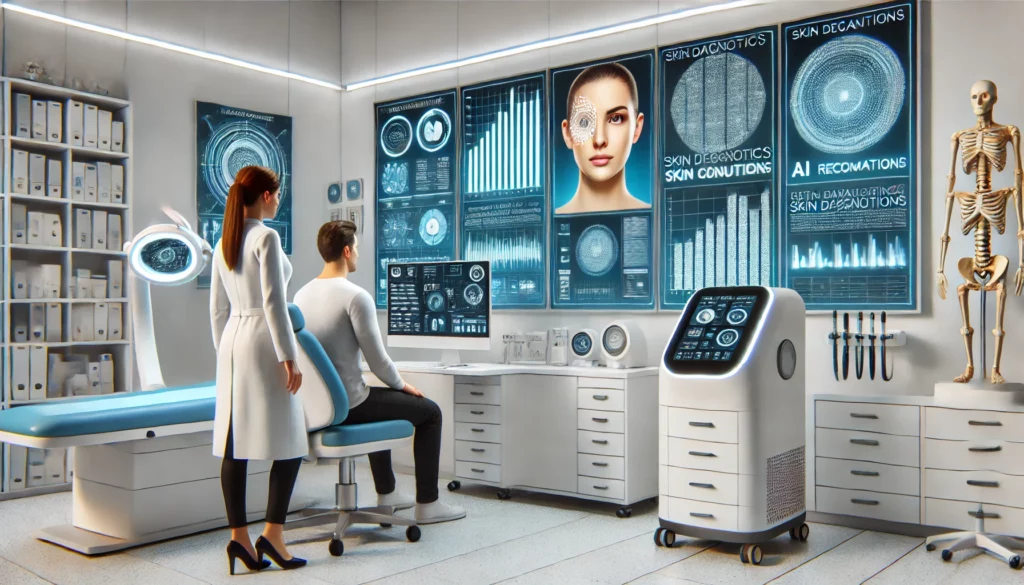Benefits of AI Automation in Dermatology Clinics

The integration of artificial intelligence (AI) in dermatology is transforming how clinics diagnose, treat, and manage skin conditions. AI automation offers dermatologists powerful tools to enhance diagnostic accuracy, streamline operations, and provide personalised care. This article explores the key benefits of AI automation in dermatology clinics and how it is shaping the future of dermatological care.
Introduction
AI is revolutionising healthcare, and dermatology is one of the specialties that has greatly benefited from this technology. From diagnosing skin cancer to optimising treatment plans, AI automation is helping dermatologists provide better, more efficient care. As the demand for dermatological services continues to grow, AI offers a way to meet these needs with enhanced precision and efficiency.
Key Benefits of AI Automation in Dermatology
Improved Diagnostic Accuracy
AI has proven to be a powerful tool in enhancing the accuracy of diagnoses in dermatology. AI algorithms, particularly those based on deep learning, can analyse vast amounts of medical images and data to detect patterns that may be missed by human eyes. Studies have shown that AI can improve diagnostic accuracy in skin cancer detection, often surpassing the performance of dermatologists in identifying malignant lesions(Stanford Medicine).
- Skin Cancer Detection: AI models trained on thousands of images can accurately distinguish between benign and malignant lesions, aiding dermatologists in early and precise diagnosis.
- Image Analysis: AI assists in the analysis of images for various skin conditions, such as psoriasis and eczema, improving diagnostic speed and reliability.
Enhanced Efficiency and Time Management
AI automation helps dermatology clinics improve efficiency by automating routine tasks and freeing up clinicians’ time for more complex care. Tools like AI-powered medical scribes can automatically capture visit notes, summarize patient history, and flag important details, reducing the manual workload on healthcare providers(Postgraduate Medical Education).
- Automated Documentation: AI tools can handle documentation, allowing dermatologists to focus more on patient interaction rather than administrative tasks.
- Workflow Optimisation: AI assists in scheduling, follow-ups, and patient management, enhancing overall clinic efficiency.
Personalised Treatment Plans
AI in dermatology supports personalised care by analysing patient data to tailor treatment recommendations. AI-driven models can predict how patients will respond to certain treatments based on their medical history, genetic information, and lifestyle factors, leading to more effective and individualised care(Dermatology Times).
- Treatment Prediction: AI can forecast the number of sessions required for cosmetic treatments, such as laser therapy or acne scar removal, optimising patient outcomes and managing costs.
- Data-Driven Decisions: AI supports dermatologists in making evidence-based decisions, enhancing the personalisation of care and improving patient satisfaction.
Reduced Diagnostic Errors and Human Bias
AI helps reduce diagnostic errors by providing objective assessments that are not influenced by fatigue or bias. This is particularly valuable in dermatology, where visual examination plays a significant role. AI can assist dermatologists in identifying subtle signs of skin conditions that might be overlooked, improving overall diagnostic reliability(The Open Dermatology Journal).
- Objective Analysis: AI provides unbiased evaluations of skin conditions, reducing the risk of misdiagnosis and improving patient trust.
- Error Reduction: By cross-referencing large datasets, AI helps minimise errors commonly associated with manual diagnoses.
Enhanced Patient Engagement and Education
AI technology, such as interactive tools and AI-driven applications, plays a vital role in educating patients and enhancing their engagement with treatment plans. AI-powered virtual assistants and interactive platforms can guide patients through their skincare routines, offer treatment recommendations, and simulate potential outcomes of cosmetic procedures(Dermatology Times).
- Virtual Assistants: AI chatbots provide answers to common dermatological questions, helping patients understand their conditions and care options.
- Educational Tools: AI-driven apps can simulate the effects of skincare products, allowing patients to make informed decisions about their treatments.
FAQs
How does AI improve diagnostic accuracy in dermatology?
AI improves diagnostic accuracy by analyzing vast amounts of medical data and images to identify patterns associated with specific skin conditions. This technology assists dermatologists in making more accurate diagnoses, particularly in detecting skin cancer.
What are the efficiency benefits of AI automation in dermatology clinics?
AI automation streamlines routine tasks, such as documentation and scheduling, freeing up clinicians’ time for patient care. This improves clinic efficiency and allows dermatologists to focus on complex diagnostic and treatment tasks.
Can AI help personalise treatment plans in dermatology?
Yes, AI analyses patient data to predict how individuals will respond to treatments, enabling dermatologists to tailor care plans based on the patient’s unique characteristics, history, and needs.
How does AI reduce diagnostic errors in dermatology?
AI provides objective assessments by analysing data without the biases that can affect human judgment. This reduces the likelihood of errors and improves the reliability of diagnoses.
What role does AI play in patient education and engagement?
AI-powered tools and applications help educate patients about their conditions and care options. Interactive platforms can guide patients through treatment processes, enhancing engagement and adherence to treatment plans.
Conclusion
The benefits of AI automation in dermatology clinics are clear: improved diagnostic accuracy, enhanced efficiency, personalized care, and reduced errors. By integrating AI into daily practice, dermatologists can provide more precise, efficient, and patient-centered care. As AI technology continues to advance, its role in dermatology will only grow, offering new opportunities to enhance patient outcomes and transform the field of dermatological care.